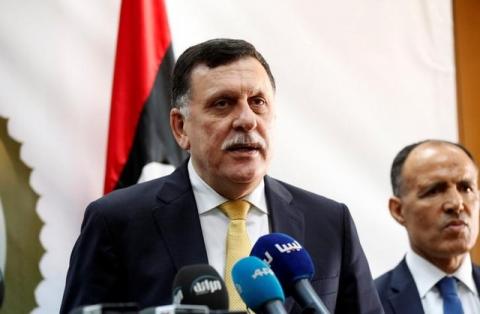Advertisement
Libyans will defeat local Islamic State themselves - unity government PM
TRIPOLI (Reuters) - Libya is uniting its various armed factions and will be able to eradicate Islamic State militants on its territory with its own forces, the head of the U.N.-backed unity government in Tripoli said on Friday.
Prime Minister Fayez Seraj said his Government of National Accord (GNA) was working with brigades from the western city of Misrata and eastern Ajdabiya that were advancing on the radical Islamist movement in their coastal stronghold of Sirte.
No one - not even the controversial eastern commander Khalifa Haftar - would be excluded from a national army as long as they submitted to central political authority, he told Reuters in his first interview with international media since arriving in Tripoli in late March.
"We are sure that the battle and the eradication of Islamic State will be carried out by Libyans," he said.
"I think that what was achieved from Ajdabiya to Sirte and from Misrata to Sirte was a good achievement, given the capabilities that the fighters have."
Seraj's government is the result of a U.N.-mediated deal to stop the anarchy and conflict plaguing Libya since the 2011 uprising that ended Muammar Gaddafi's four decades in power.
Western states see it as the best hope for uniting Libya's many political factions and armed groups to tackle Islamic State and crack down on people smuggling across the Mediterranean.
Both crises have been highlighted in the past two weeks, with armed forces loyal to the GNA pushing Islamic State back around Sirte and hundreds of migrants dying in a new wave of boat departures from western Libya.
'GREAT HOPE'
A week ago brigades based in Misrata reached the outskirts of Sirte, while the Petroleum Facilities Guard, which controls oil terminals in eastern Libya, have recaptured two towns about 130 km (80 miles) east of Sirte.
Haftar's forces have also announced plans to move on Sirte, though they are still engaged in a battle with Islamists and other opponents for control of the eastern city of Benghazi.
Seraj played down fears that competing campaigns for Sirte would revive conflict between factions in the east and west.
"I have great hope that the two sides will be united," he said.
It was too early to talk about a timeframe for the battle for Sirte, Seraj said. The GNA is still working to build a unified command structure.
He confirmed that Libyan brigades had been benefiting from international intelligence, though he would not comment on the activities of Western special forces.
"Security and intelligence information, lifting the arms embargo, that's the international assistance we are talking about."
Seraj said he had tried to persuade Haftar, a popular figure in the east but despised by many in western Libya, to cooperate with the GNA - and that there could still be a place for him in a future military structure.
"We're not going to exclude anyone like Haftar, or any other person, as long as he obeys the political leadership," he said.
BLOCKED VOTE
Libya's conflict escalated in 2014, when loose alliances of armed groups fought for control of Tripoli. The internationally recognized parliament and government moved to the east, and a rival set of institutions was set up in the capital.
Since the GNA arrived with the backing of Misrata's powerful brigades, the self-decalared government in Tripoli has faded - though the GNA's leadership still operates from the secure naval base on the seafront where Seraj was speaking.
Nationally, the GNA's progress has been hampered by its failure to win formal approval from the House of Representatives (HOR), the eastern parliament. Hardliners in Tobruk, the city were the parliament is based, have repeatedly blocked a vote.
Seraj said he was still pushing for the HOR to convene, possibly in another city.
"I'm trying to stress to them and convince them that they should hold a session in the near future – in any place – just to take their responsibility to make the right decision about many issues," Seraj said.
The HOR is meant to decide on the leadership of the central bank, which like the National Oil Corporation and the sovereign wealth fund, currently has two rival heads. Seraj said he expected decisions on the leadership of those institutions in the "near future".
SMUGGLERS' BOATS
As with the fight against Islamic State, Seraj said Libya should retain sovereign control over tackling the crisis of migration between Libya and Italy.
He signaled his opposition to the expansion of the EU's naval mission into Libyan waters, saying that destroying smugglers' boats on Libya's shores was "not a solution", and the problem must be dealt with in migrants' countries of origin.
Seraj said he was working with the EU and neighboring states including Niger and Chad to find a formula for repatriating Europe-bound migrants to their countries and not to Libya, and that in the meantime, Libya needed humanitarian assistance to feed and house migrants passing through.
"It upsets us that many people have lost their lives on the shores of Libya, shores that should be a place of prosperity, that should be full of life and not death," he said.
(Writing by Aidan Lewis; Editing by Tom Heneghan and Angus MacSwan)



















Add new comment